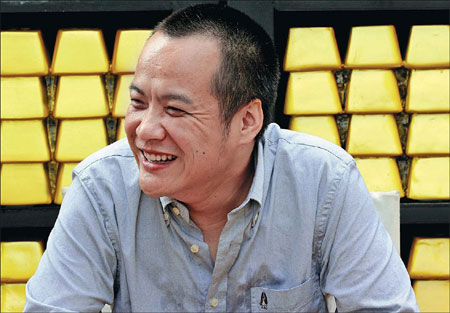Movie
Going for Gold
Updated: 2011-08-09 08:39
By Liu Wei (China Daily)
|
Director Ning Hao promotes his new movie in Shanghai, saying it's a mix of heist, black comedy, war and action genres. Zheng Fude / for China Daily |
 |
Ning Hao's latest film, after the ill-fated No Man's Land, is about growing pains and robbery. Liu Wei reports.
Mainland director Ning Hao says his latest film talks about "growing pains", something he knows about. Since he broke into the Chinese film scene in 2006 with the small-budget comedy Crazy Stone, Ning has been one of the few filmmakers with both a critical reputation and box office success, in China.
Stone cost just 5 million yuan ($778,000) to make but earned 20 million yuan. The following film, Crazy Racer, was made with 20 million yuan and raked in 100 million yuan.
Fans and critics compared him to the United Kingdom's Guy Ritchie and his next film, No Man's Land, was highly anticipated, but few people actually got to see it.
The film wrapped up in 2009 but was never released, likely because it did not receive approval from the State Administration of Radio, Film and TV (SARFT).
Scriptwriter Zhao Baohua, a SARFT censorship committee member, wrote on his blog in early 2010 the film "has no hero, just villains". He further commented that it was divorced from reality and the director had lost his sense of social responsibility.
However, according to some critics that Ning invited to see the film shortly after it wrapped, it is brilliant.
The situation caused controversy, but Ning has refused to dwell on it and moved on to make another film.
"No Man's Land is an old chapter," the 34-year-old says on the set of his new film, tentatively titled Robbing the Gold, in Shanghai.
He says No Man's Land is in the hands of his production company and he doesn't know whether it will ever be shown.
"I have moved on. For me, the most important thing is what I've learned making the film. No Man's Land discusses the relationship between man's animal instincts and social responsibility. I now have a better understanding of the subject, that's good enough for me."
He prefers to focus the conversation on Robbing the Gold.
The film is set in Northeast China in the 1930s, where Japanese troops set up a puppet government and made Puyi, the last emperor of China, ruler. The store signs on the streets are in both Chinese and Japanese. Several vintage cars were renovated for some of the scenes.
Ning says 90 percent of the budget went on production, rather than casting. His team went to Japan to find photos and postcards from the era, and spent 3.8 million yuan decorating a character's house. Most props, from a small casket, to a rickshaw, were made instead of rented.
The most eye-catching props are piles of "gold bars". They are central to the action, which focuses on a bank robbery by several youngsters in the 1930s.
Ning also employs an impressive crew, including Zhao Fei, cinematographer of Zhang Yimou's Raise the Red Lantern and Woody Allen's Small Time Crooks; and Second Chan, art director of Kung Fu Hustle.
Ning describes the film's genre as a mix of heist, black comedy, war and action, while an executive of the production company compares it to Quentin Tarantino's Inglourious Basterds.
But there is no big star such as Brad Pitt. Although Ning's friends, like comedian Huang Bo, make cameo appearances, the lead actors are newcomers. Four of them are students from a training class Ning started earlier this year.
"I am not obsessed with big stars," he says. "Instead I have faith in a good story and high-quality production. I have been doing that since my first film and it works."
The film has humorous moments, just like his Crazy series, but Ning hopes it will leave the audience thinking about "the price of growing up".
Although he does not reveal the plot, he does mention the robbers have a good reason for their actions. In view of the story's background, it is not difficult to conclude that they rob from the Japanese.
"Growing up often comes with pains," he says. "So I set the story in wartime. Growing up in wartime is much more painful. When we talk about the price of growing up today, I'm sure people who have grown up during war must laugh. Their cost of growing up was life and family. Compared to them we have nothing to complain about."

Specials

Star journalist leaves legacy
Li Xing, China Daily's assistant editor-in-chief and veteran columnist, died of a cerebral hemorrhage on Aug 7 in Washington DC, US.

Beer we go
Early numbers not so robust for Beijing's first international beer festival

Lifting the veil
Beijing's Palace Museum, also known as the Forbidden City, is steeped in history, dreams and tears, which are perfectly reflected in design.
